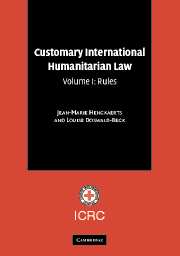Book contents
- Frontmatter
- Contents
- Foreword by ICRC President Jakob Kellenberger
- Foreword by Judge Abdul G. Koroma
- Foreword by Yves Sandoz
- Acknowledgements
- Introduction
- List of abbreviations
- Part I The Principle of Distinction
- Part II Specifically Protected Persons and Objects
- Part III Specific Methods of Warfare
- Part IV Weapons
- Part V Treatment of Civilians and Persons Hors De Combat
- Part VI Implementation
- Chapter 40 Compliance with International Humanitarian Law (Rules 139–143)
- Chapter 41 Enforcement of International Humanitarian Law (Rules 144–148)
- Chapter 42 Responsibility and Reparation (Rules 149–150)
- Chapter 43 Individual Responsibility (Rules 151–155)
Chapter 43 - Individual Responsibility (Rules 151–155)
Published online by Cambridge University Press: 05 June 2012
- Frontmatter
- Contents
- Foreword by ICRC President Jakob Kellenberger
- Foreword by Judge Abdul G. Koroma
- Foreword by Yves Sandoz
- Acknowledgements
- Introduction
- List of abbreviations
- Part I The Principle of Distinction
- Part II Specifically Protected Persons and Objects
- Part III Specific Methods of Warfare
- Part IV Weapons
- Part V Treatment of Civilians and Persons Hors De Combat
- Part VI Implementation
- Chapter 40 Compliance with International Humanitarian Law (Rules 139–143)
- Chapter 41 Enforcement of International Humanitarian Law (Rules 144–148)
- Chapter 42 Responsibility and Reparation (Rules 149–150)
- Chapter 43 Individual Responsibility (Rules 151–155)
Summary
Rule 151. Individuals are criminally responsible for war crimes they commit.
Practice
Volume II, Chapter 43, Section A.
Summary
State practice establishes this rule as a norm of customary international law applicable in both international and non-international armed conflicts.
International armed conflicts
The principle of individual criminal responsibility for war crimes is a long-standing rule of customary international law already recognised in the Lieber Code and the Oxford Manual and repeated in many treaties of international humanitarian law since then. Individual criminal responsibility for war crimes committed in international armed conflicts was the basis for prosecutions under the Charters of the International Military Tribunals at Nuremberg and at Tokyo, as it is under the Statute of the International Criminal Tribunal for the Former Yugoslavia and the Statute of the International Criminal Court.
Numerous military manuals specify that individuals are criminally responsible for war crimes. The principle of individual criminal responsibility for war crimes is implemented in the legislation of numerous States. Many suspected war criminals have been tried on the basis of this principle. This rule is also supported by official statements and reported practice.
The principle has also been recalled in numerous resolutions of the UN Security Council, UN General Assembly and UN Commission on Human Rights. It has also been recalled on many occasions by other international organisations.
Non-international armed conflicts
With respect to non-international armed conflicts, significant developments took place from the early 1990s onwards.
- Type
- Chapter
- Information
- Customary International Humanitarian Law , pp. 551 - 567Publisher: Cambridge University PressPrint publication year: 2005



